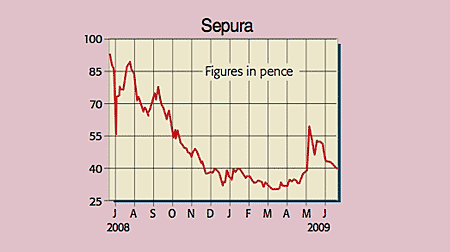Get the latest financial news, insights and expert analysis from our award-winning MoneyWeek team, to help you understand what really matters when it comes to your finances.
You are now subscribed
Your newsletter sign-up was successful
Want to add more newsletters?

Twice daily
MoneyWeek
Get the latest financial news, insights and expert analysis from our award-winning MoneyWeek team, to help you understand what really matters when it comes to your finances.

Four times a week
Look After My Bills
Sign up to our free money-saving newsletter, filled with the latest news and expert advice to help you find the best tips and deals for managing your bills. Start saving today!
Back in the 1990s when mobile phones were first launched, it became apparent that the police, ambulance and fire services would need their own dedicated wireless network.
This network would need to be separate from the public Global System for Mobile communications (GSM) to prevent the interception of voice-calls and ensure it was functioning 100% of the time to handle emergencies.
So a new encrypted and super-reliable standard was born called Terrestrial Trunked Radio (TETRA). Since then, the technology has begun to be used in 104 countries, with Britain and Germany being the largest markets.
MoneyWeek
Subscribe to MoneyWeek today and get your first six magazine issues absolutely FREE

Sign up to Money Morning
Don't miss the latest investment and personal finances news, market analysis, plus money-saving tips with our free twice-daily newsletter
Don't miss the latest investment and personal finances news, market analysis, plus money-saving tips with our free twice-daily newsletter
This is where Sepura steps in.
It is the world's second-largest TETRA radio supplier behind Motorola, with around 29% of the market. The firm sold 125,500 devices in 2008 at an average price of £591 a piece. Of its revenues, 60% are derived from overseas and the firm closed the year with net cash of £5.4m.
However, the City was upset by the board's cautious outlook. Because of the credit crunch, new international deployments of TETRA in Hungary, Spain, South Korea and Mexico are temporarily being delayed, pushing order-intake into the future. But the fundamentals remain sound and Sepura is now starting to see a healthy replacement cycle as other territories, such as the UK, upgrade to lighter, more durable and faster radios.
Sepura (LSE: SEPU)

The City expects 2009 turnover and Ebita of £77m and £10m respectively, rising to £82m and £10.8m in 2010. To me, these projections look kitchen-sinked. But even if things turn out to be this nasty, I still expect Sepura to achieve healthy top-line growth and widening profitability from 2011 onwards, in line with improved economies of scale. On this basis, using a 12% discount rate and an eight times Ebita multiple, I reckon the stock is worth about 60p a share.
There are risks, of course, not least from possible contract delays, foreign exchange fluctuations and fast-changing technologies. However, with a sound balance sheet, cutting-edge products and low exposure to bad debt, I believe the stock offers good value to the more adventurous investor.
Recommendation: speculative BUY at 37.75p (market capitalisation £51.5m)
Paul Hill also writes a weekly share-tipping newsletter, Precision Guided Investments
Get the latest financial news, insights and expert analysis from our award-winning MoneyWeek team, to help you understand what really matters when it comes to your finances.
Paul gained a degree in electrical engineering and went on to qualify as a chartered management accountant. He has extensive corporate finance and investment experience and is a member of the Securities Institute.
Over the past 16 years Paul has held top-level financial management and M&A roles for blue-chip companies such as O2, GKN and Unilever. He is now director of his own capital investment and consultancy firm, PMH Capital Limited.
Paul is an expert at analysing companies in new, fast-growing markets, and is an extremely shrewd stock-picker.
-
 Should you buy an active ETF?
Should you buy an active ETF?ETFs are often mischaracterised as passive products, but they can be a convenient way to add active management to your portfolio
-
 Power up your pension before 5 April – easy ways to save before the tax year end
Power up your pension before 5 April – easy ways to save before the tax year endWith the end of the tax year looming, pension savers currently have a window to review and maximise what’s going into their retirement funds – we look at how